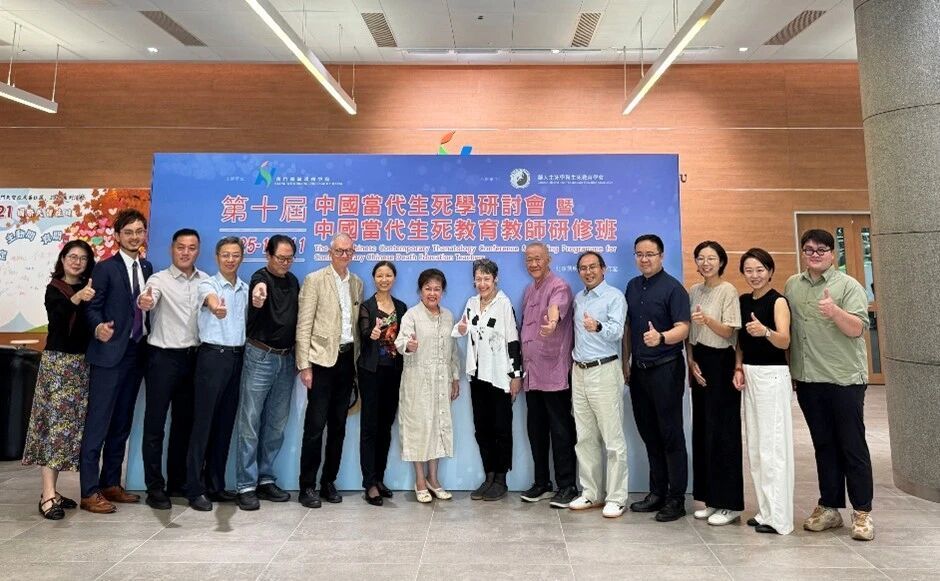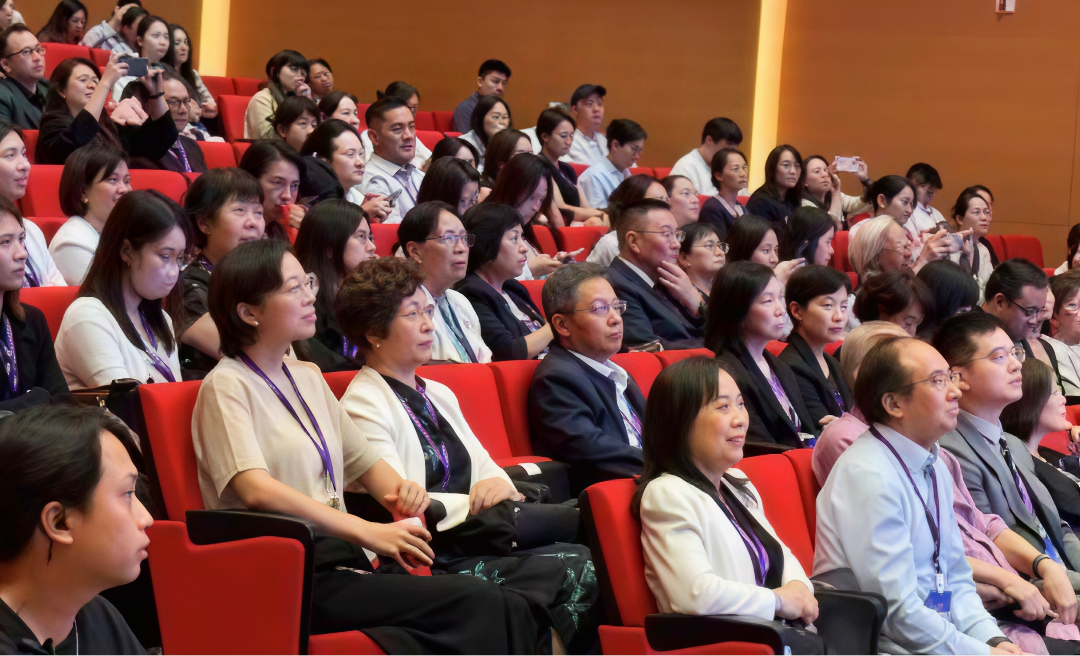"10th China Contemporary Thanatology Symposium in Macao: Yinfeng Promotes Life Education Through Technology"
Release time:
2025-10-14
From October 10 to 11, 2025, the "10th China Contemporary Thanatology Symposium: Chinese Thanatology from a Global Perspective" and the "China Contemporary Death Education Teacher Training Program (Basic and Advanced Levels)" concluded successfully at Macao Jinghu College of Nursing. Co-hosted by Macao Jinghu College of Nursing and the Chinese Society for Thanatology and Death Education, this academic event gathered over 100 experts and scholars from home and abroad, more than 400 offline participants, and over 2,500 online attendees. Engaging in in-depth dialogues on cutting-edge issues such as death education and hospice care, it infused new momentum into the development of Chinese thanatology. As a supporting unit, the Shandong Yinfeng Life Science Public Welfare Foundation (hereinafter referred to as "Yinfeng Foundation") participated in and witnessed this annual event in the field of thanatology throughout its duration.

Keynote Speeches: Decoding Thanatological Propositions from Multiple Dimensions
On the first day of the symposium, eight keynote speeches centered on core thanatological themes, covering diverse dimensions such as "peridying," near-death experiences, the meaning of life, cross-cultural comparison, ethics of hospice care, and research on local death cultures. Scholars approached these topics from perspectives including medicine, philosophy, sociology, and cultural studies. They not only delved into theoretical explorations of abstract concepts like "exploring near-death states" and "the meaning of life" but also conducted empirical analyses of practical issues such as "differences in end-of-life models between China and the U.S." and "ethical considerations in cross-cultural communication about terminal illness." This sparked profound contemplation on life and death, guiding reflections on the meaning and value of life while emphasizing the importance of strengthening public death education and respecting individual autonomy over life. It laid a more locally grounded academic foundation for Chinese thanatology research.
Practical Implementation: Sub-forums and Training Programs Deepen Grounding
In the afternoon, three parallel sub-forums were held: "Death Education and Death Literacy," focusing on educational pathways for medical professionals; "Research on Hospice Care and Caregiving Practices," exploring ethical challenges in local Chinese practices; and "Research on Death Cultures," revealing the significance of cultural differences in facilitating international communication in thanatological education.
At the symposium, Professor Lei Weifu from Qilu Hospital of Shandong University—also Honorary Director of the Anesthesiology Branch of Shandong Medical Association and former Director of the Anesthesia Quality Control Center of Shandong Health Commission—shared forward-looking insights in his presentation Cryonics and Regeneration in Hospice Care (Palliative Care). He emphasized humanistic care and respect for the dignity of life in palliative care, noting that cryonics, as an extension of existing medical technology, not only offers hope to patients and their families but also drives progress in cryobiomedical research, organ donation, and body donation initiatives.
On the same day, the "Death Education Teacher Training Program" kicked off, where over 50 young practitioners from the medical and educational fields deepened their understanding of death education under the guidance of senior experts. As "carriers of life’s continuity," they are poised to sustain the power of life.
Yinfeng’s Participation: Technology and Humanity Jointly Sustain Life Education
Life education is not merely about transmitting knowledge but safeguarding the dignity of life. Yinfeng’s involvement exemplifies its practical commitment to supporting thanatological research and advancing societal progress in life culture.
Li Qingping, Director of the Public Welfare Publicity Center at Yinfeng Foundation, stated: "As Yinfeng has always emphasized, the warmth of technology lies in enabling more people to feel the dignity of life and the possibility of its continuation. Through supporting academic exchanges, we aim to draw greater attention to life culture and build social consensus around technological explorations for 'life extension.'"
Over the two days, the symposium was not only a collision of ideas but also seeds sown to advance social progress in life culture. The Shandong Yinfeng Life Science Public Welfare Foundation will continue to use technology as wings and culture as roots, collaborating with all sectors of society to enhance the quality of life for the Chinese people and build a human-centered life care system.
Latest developments
Public Welfare Partnership: A Special Letter from the Jinan Red Cross
On the afternoon of January 30, 2026, the Jinan Red Cross presented a letter of special significance to the Shandong Yinfeng Life Science Public Welfare Foundation (hereinafter referred to as the Yinfeng Foundation).
World’s First Achievement Highlights Brand Leadership
In the future, Yinfeng Life Science Research Institute will continue to uphold its mission of "Dedicated to Medical Technology, Safeguarding Human Health." It will empower brand building with more original and pioneering scientific and technological achievements, contributing wisdom and strength to Shandong's goal of building a national regional innovation hub and promoting Chinese brands on the global stage.
Global First Ovarian Tissue Dual Activation Technology Debuts at 2025 Jinan Achievements Conference
Currently, the ovarian tissue dual activation technology has been successfully applied in clinical practice at Beijing University of Chinese Medicine Shenzhen (Longgang) Hospital, having treated over 400 patients with a treatment success rate of 70%. Over the next three years, Shandong Yinfeng Life Science Research Institute plans to use Jinan as a center to gradually expand the transformation and application of this technological achievement nationwide.
According to the latest announcement from the International Society of Cryobiology, Professor Xu Yi from the School of Health Science and Engineering at the University of Shanghai for Science and Technology, and a member of the Yinfeng Cryomedicine Expert Committee, has been elected as a Board Governor of the Society for a three-year term (2026–2028). The election was conducted through a democratic vote by all members worldwide, with three new Board Governors elected. Professor Xu Yi is the only scholar from Asia elected to the Society’s Board of Governors this time and the third elected scholar from mainland China in the Society’s 60-year history.
The significance of life extension lies not only in technological breakthroughs but also in the shared belief of every individual who believes in "a better future." With faith as their torch, these fellow travelers join hands, pooling their strength to stride forward together. We firmly believe that as this steadfast support converges into a powerful force, it will propel the Yinfeng Life Extension Plan to gain broader attention, inject continuous momentum into the development of cryobiomedicine, and illuminate the next chapter of human civilization.
Over the two days, the symposium was not only a collision of ideas but also seeds sown to advance social progress in life culture. The Shandong Yinfeng Life Science Public Welfare Foundation will continue to use technology as wings and culture as roots, collaborating with all sectors of society to enhance the quality of life for the Chinese people and build a human-centered life care system.












